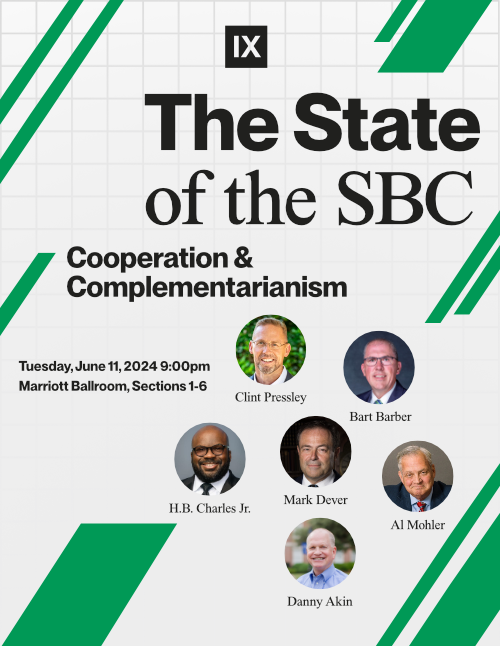
9Marks Journal: The Church Singing (43期:教會的詩歌敬拜)
Singing is not one of the nine marks, a point which, not surprisingly, has come up once or twice with my minister-of-music father. That said, okay, yes, 9Marks does have a few opinions on music. Our understanding of the local church pushes us toward a slightly different perspective on church singing than some of our evangelical brothers and sisters. The difference comes down to the question of performance. Who is performing? The congregation or the people on stage? Dimming the lights and turning up the volume of instruments and leaders doesn’t necessarily mean you have turned the congregation into an audience, but it often does. Or think about it like this: is the “worship experience” in your church a solo transaction between the individual worshipper and God as stimulated by a high-emotion performer up front? Because here is an alternative: the musicians and song leaders help to facilitate an intellectually and emotionally engaged communal experience where members sing to one another while singing to God. The primary thing people hear is the faith-reinforcing praises and laments of their fellow saints. “I’m not the only one who rejoices like this…mourns like this…pleads like this. So does everyone around me!” They don’t listen for the organ, electric guitar, or praise ensemble. They listen for the folksy and hearty voices of other pilgrims walking alongside them on this long and rocky road of Christian obedience, rehearsing old memories of Calvary and new hopes of the heavenly city. Are these just my preferences that I’m trying to impose? I hope not. Think about what the New Testament emphasizes when it comes to the church’s corporate music. It doesn’t talk about crafting a highly charged worship “experience.” Interestingly, it doesn’t use the language of “worship” at all in this context (which is not to deny that corporate singing is worship). Instead, the Bible talks about the congregation singing to one another (Col. 3:16; Eph. 5:19), and doing everything for the sake of edifying one another (1 Cor. 14). That’s it: people singing together. When it comes to the topic of music, Christians might do well to talk about the church singing or the congregation singing because that’s what the Bible talks about. In this edition of the 9Marks Journal, we start with singing and the song. Why do congregations sing, what should they sing about, and how can they sing better? We then think more carefully about the music itself, particularly with two different perspectives on whether or not some musical forms are better than others. Finally we think about what is involved in leading music.
歌唱並不是九個標誌之一,不出意料,這一點也被作爲音樂敬拜牧師的父親提起一兩次。
好吧,其實九標誌事工的確對於音樂有一些見解。我們對地方教會的認識使得我們與其他福音派弟兄姐妹就教會唱詩方面有些許不同的觀點。
這區別可以歸結爲敬拜參與的問題。誰是參與者?會眾還是在臺上帶領的人?將燈光調暗,調高樂器和領唱者的音量並不等同於你把會眾變爲聽眾,但實際情況通常如此。
或者想一下這樣的場景:你教會的「敬拜體驗」是個別在臺前擁有高昂情緒的敬拜帶領者與神之間個人的互動嗎?
其實還有另一種做法:樂手和詩歌帶領者幫助促進在智識上和情緒上更親近的群體經歷,當會眾向神歌唱時,他們也彼此對唱。人們首先聽到的是同爲聖徒的肢體信心得以堅固所發出的讚美和哀傷。「我並不是獨自一人如此歡呼……如此哀傷……如此懇求。我身邊的每個人都是如此!」他們不是來傾聽風琴、電吉他或者讚美合奏。他們是來傾聽其他在漫長坎坷的基督徒順服之路上一同陪伴的天路客平凡而又發自內心的歌聲,重現各各他山的古舊回憶,以及預演天上聖城的全新盼望。
這些僅僅是我要強加給人的喜好嗎?我希望不是。請思想新約所強調的教會公共敬拜的樣式。它並沒有談論製造充滿情感的敬拜「體驗」。有趣的是,聖經在這樣的處境中根本沒有使用「敬拜」這樣的語言(這並非否認公共唱詩屬於敬拜)。相反,聖經談到的是會眾彼此對說(西3:16;弗5:19),並且凡事爲了彼此造就的緣故(林前14)。也就是說:會眾一起歌唱。論及音樂的話題,基督徒應該好好討論教會唱詩或會眾唱詩,因爲這是聖經所教導的。
在本期的九標誌期刊中,我們首先討論唱詩及詩歌。爲什麼會眾一起歌唱,他們應該唱什麼,他們可以如何更好地歌唱?我們接著會更仔細思考音樂本身,尤其是關於是否某種音樂形式好過其它形式的話題,帶來兩種不同的觀點。最後我們會思考帶來音樂敬拜時所涉及的內容。





